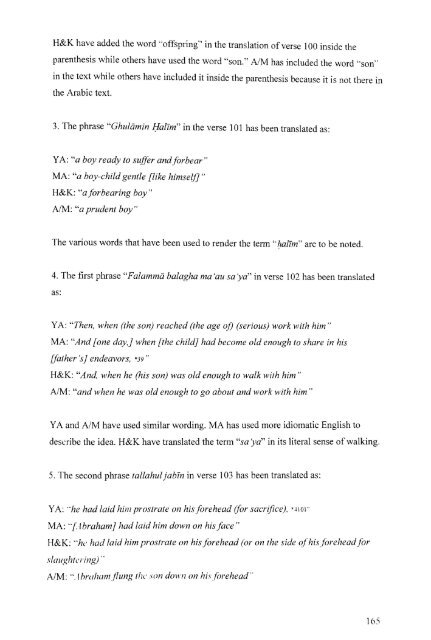A thematic comparative review of some English translations of the ...
A thematic comparative review of some English translations of the ...
A thematic comparative review of some English translations of the ...
Create successful ePaper yourself
Turn your PDF publications into a flip-book with our unique Google optimized e-Paper software.
H&K have added <strong>the</strong> word "'<strong>of</strong>fspring" in <strong>the</strong> translation <strong>of</strong> verse 100 inside <strong>the</strong><br />
paren<strong>the</strong>sis while o<strong>the</strong>rs have used <strong>the</strong> word "son." AIM has included <strong>the</strong> word '"son"<br />
in <strong>the</strong> text while o<strong>the</strong>rs have included it inside <strong>the</strong> paren<strong>the</strong>sis because it is not <strong>the</strong>re in<br />
<strong>the</strong> Arabic text.<br />
3. The phrase "Ghulamin Jfatfm" in <strong>the</strong> verse 101 has been translated as:<br />
Y A: "a boy ready to suffer and forbear"<br />
MA: "a boy-child gentle [like himself)"<br />
H&K: "a forbearing boy"<br />
AIM: "a prudent boy"<br />
The various words that have been used to render <strong>the</strong> term '" hallm" are to be noted.<br />
4, The first phrase "Falamma balagha ma 'au sa yd' in verse 102 has been translated<br />
as:<br />
Y A: "Then, when (<strong>the</strong> son) reached (<strong>the</strong> age <strong>of</strong>) (serious) work with him"<br />
MA: "And [one day,} when [<strong>the</strong> child} had become old enough to share in his<br />
[fa<strong>the</strong>r's} endeavors, *39"<br />
H&K: "And, when he (his son) was old enough to walk with him"<br />
AIM: "and when he was old enough to go about and work with him"<br />
Y A and AIM have used similar wording. MA has used more idiomatic <strong>English</strong> to<br />
describe <strong>the</strong> idea. H&K have translated <strong>the</strong> term "sa ya" in its literal sense <strong>of</strong> walking.<br />
5. The second phrase tallahul jabin in verse 103 has been translated as:<br />
Y A: "he had laid him prostrate on his forehead (for sacrifice), *4101"<br />
MA: "I' braham} had laid him down on his face"<br />
H&K: ""he had laid him prostrate on his forehead (or on <strong>the</strong> side <strong>of</strong> hisforehead for<br />
slaughtering) "<br />
AIM: ",lhraham/lung <strong>the</strong> son down on his forehead "<br />
165
















